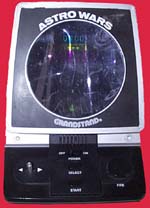
dit-dit-dit
dit-dit-dit
dit-dit-dit |
It had been over 30 years since the world's first massive electronic computers had appeared employing "primitive" valves developed from advances made during the Second World War. The technology rapidly miniaturised spurred on by a number of factors including the cold war, the developing space race and the demands of industry, commerce and the sciences. Valves were replaced by smaller transistors. Soon after transistors were replaced by the even smaller integrated circuits and the infamous microchips. Computers and electronics had become smaller and more powerful than the early computer pioneers had ever predicted. They were integrating themselves into just about every area of society and people were enthusiastic about the possibilities the new age would bring and wanted one of these modern miracles for themselves and their children. Did they create a vast planet wide network of millions of advanced computers that would allow all mankind's knowledge to be stored and used in ways never believed possible and let individuals express their ideas and philosophies on a global stage?
Unfortunately not, that dream was still 15 years away and in the meantime we had to make do with Astro Wars.
In the late 70s and early 80s arcade coin operated games such as Space Invaders, Asteroids and Pac-Man had become very popular. The downside to these was the fact you were limited to when and where you could play them and they also swallowed a lot of pocket money at rapid speed. Most of the early home computers were still very expensive and not particularly geared toward sophisticated graphics simulations of space battles and the like especially not sound effects.
The solution was a vast number of different handheld games such as Astro Wars that had one game hard-wired into them. If you were lucky you may even have got a basic LED screen as well.
Astro Wars was reasonably straight forward - Your role was that of a solitary fighter craft destined to take on the alien hordes. Sound familiar? The goal was to get a certain number of points, once you did that the game was over, you were victorious and it played a little tune.
Astro Wars was notable for a number of reasons:-
Unusually the screen was mounted nearly at right angles to the controls, similar to coin operated arcade games.
It had various stages, not just a continuous stream of alien shooting. This made the player develop a range of combat skills. There was a docking sequence where you had to dock the two halves of your spaceship for a bonus. If they hadn't lined up properly you could delay the docking by firing your thrusters accompanied by a realistic sound effect (white noise). There was also a stage where you dodged a field of alien projectiles.
A large screen. Well actually it was quite a small LED screen but some bright spark in the design department had came up with the idea of putting a magnifier on the front of it, giving the impression of largeness.
A joystick, okay it only went left and right but to the hands of an average nine year old player it was as near to the controls of a interstellar fighter that they were ever going to get.
As with most of these games, initially completing the game was difficult but once achieved the game became very easy to finish and no longer presented a major challenge. This greatly increased their boredom factor.
|


